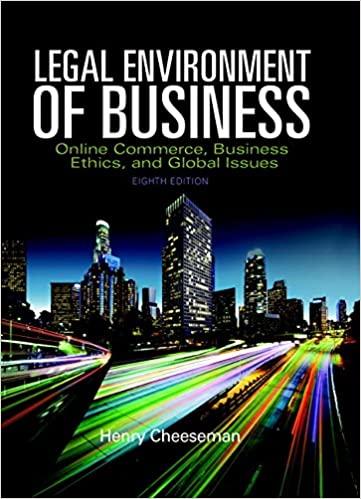Answered step by step
Verified Expert Solution
Question
1 Approved Answer
5: Paul Strich did business as an optician in Duluth, Minnesota. Paul used only the products of the Plymouth Optical Co., a national manufacturer of
5: Paul Strich did business as an optician in Duluth, Minnesota. Paul used only the products of the Plymouth Optical Co., a national manufacturer of optical products and supplies with numerous retail outlets and some franchise arrangements in areas other than Duluth. To increase business, Paul renovated his office and changed the sign on it to read "Plymouth Optical Co." Paul did business this way for more than three yearsadvertised under that name, paid bills with checks bearing the name of Plymouth Optical Co., and listed himself in the telephone and city directories by that name. Plymouth immediately became aware of what Paul was doing. However, because Paul used only Plymouth products and Plymouth did not have a franchise in Duluth, it saw no advantage at that time in prohibiting Paul from using the name and losing him as a customer. Paul contracted with the Duluth Tribune for advertising, making the contract in the name of Plymouth Optical Co. When the advertising bill was not paid, the Duluth Tribune sued Plymouth Optical Co. for payment. Plymouth's defense was that it never authorized Paul to do business under the name, nor authorized him to make a contract with the newspaper. Decide. Problem 7: Gilbert Church owned Church Farms, Inc., in Manteno, Illinois. Church advertised its well-bred stallion Imperial Guard for breeding rights at $50,000, directing all inquiries to "Herb Bagley, Manager." Herb Bagley lived at Church Farms and was the only person available to visitors. Vern Lundberg answered the ad, and after discussions in which Bagley stated that Imperial Guard would remain in Illinois for at least a two-year period, Lundberg and Bagley executed a two-year breeding rights contract. The contract was signed by Lundberg and by Bagley as "Church Farms, Inc., H. Bagley, Mgr." When Gil Church moved Imperial Guard to Oklahoma prior to the second year of the contract, Lundberg brought suit for breach of contract. Church testified that Bagley had no authority to sign contracts for Church Farms. Decide. [ Lundberg v. Church Farms, Inc., 502 N.E.2d 806 (Ill.)] Problem 8: Gilbert Church owned Church Farms, Inc., in Manteno, Illinois. Church advertised its well-bred stallion Imperial Guard for breeding rights at $50,000, directing all inquiries to "Herb Bagley, Manager." Herb Bagley lived at Church Farms and was the only person available to visitors. Vern Lundberg answered the ad, and after discussions in which Bagley stated that Imperial Guard would remain in Illinois for at least a two-year period, Lundberg and Bagley executed a two-year breeding rights contract. The contract was signed by Lundberg and by Bagley as "Church Farms, Inc., H. Bagley, Mgr." When Gil Church moved Imperial Guard to Oklahoma prior to the second year of the contract, Lundberg brought suit for breach of contract. Church testified that Bagley had no authority to sign contracts for Church Farms. Decide. [ Lundberg v. Church Farms, Inc., 502 N.E.2d 806 (Ill.)] Problem 10: Steve Diezel, an employee of Island City Flying Service in Key West, Florida, stole a General Electric Credit Corp. (GECC) aircraft and crashed the plane while attempting to take off. GECC brought suit against Island City on the theory that it had negligently hired Diezel as an employee and was therefore legally responsible for Diezel's act of theft. Diezel had a military prison record as a result of a drug offense and had been fired by Island City twice previously but had been immediately reinstated each time. Island City claimed that the evidence was insufficient to establish that it had been negligent in employing Diezel. Decide. [ Island City Flying Service v. General Electric, 585 So. 2d 274 (Fla.)] Problem 12: Steven Trujillo, told by the assistant door manager of Cowboys Bar "to show up to work tonight in case we need you as a doorman," came to the bar that evening wearing a jacket with the bar logo on it. Trujillo "attacked" Rocky Medina in the parking lot of the bar, causing him serious injury. Prior to working for Cowboys, Trujillo was involved in several fights at that bar and in its parking lot, and Cowboys knew of these matters. Medina sued Cowboys on two theories of liability: * respondeat superior and * negligent hiring of Trujillo. Cowboys's defense was that the respondeat superior theory should be dismissed because the assault was clearly not within the course of Trujillo's employment. Concerning the negligent hiring theory, Cowboys asserted that Trujillo was not on duty that night as a doorman. Decide. [ Medina v. Graham's Cowboys, Inc., 827 P.2d 859 (N.M. App.)]
Step by Step Solution
There are 3 Steps involved in it
Step: 1

Get Instant Access to Expert-Tailored Solutions
See step-by-step solutions with expert insights and AI powered tools for academic success
Step: 2

Step: 3

Ace Your Homework with AI
Get the answers you need in no time with our AI-driven, step-by-step assistance
Get Started


